Why Trump’s UK state visit is mired with potential pitfalls
 James LandaleDiplomatic correspondent
James LandaleDiplomatic correspondent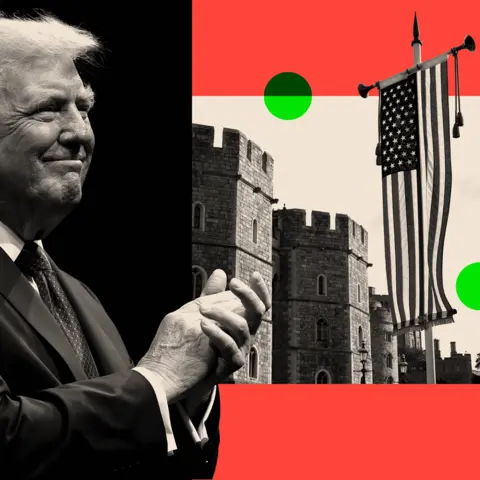 BBC
BBCUS President Donald Trump’s state visit to the United Kingdom this week will be no stranger to controversy, just as his first was six years ago.
Back then, in June 2019, as well as taking tea with the late Queen, the US President called London Mayor Sadiq Khan “a stone-cold loser”, backed Boris Johnson in a Tory leadership race and suggested the NHS should be part of US-UK trade talks.
All this was accompanied by a petition saying he should not receive a state visit in the UK, signed by more than one million people, as well as noisy protests involving thousands and a huge inflatable effigy that became known as the Trump Baby.
This week’s second state visit – unprecedented for a non-royal – will prove the first was no exception.
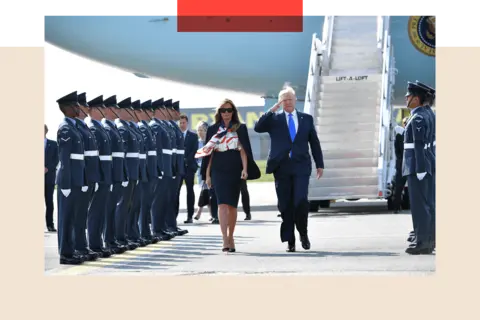 Mandel Ngan/AFP via Getty Images
Mandel Ngan/AFP via Getty ImagesThere will again be protests and Lord Mandelson’s sacking as UK ambassador to the US has already cast a diplomatic pall over proceedings.
Planning for the visit – over Wednesday and Thursday – has gone on for months, but for all the careful preparation, the possibility that things could go wrong is still very real.
And for many of those organising it, the Mandelson affair is only one of their worries.
How Windsor became ‘Trumpton’
For those at the royal end of the show, the focus has been on logistics and security – and turning Windsor Castle into a ring of steel hard enough to satisfy even the most fastidious secret service agents.
Such has been the huge American presence some locals have renamed Windsor “Trumpton”, after the eponymous town in the 1970s children’s TV show.
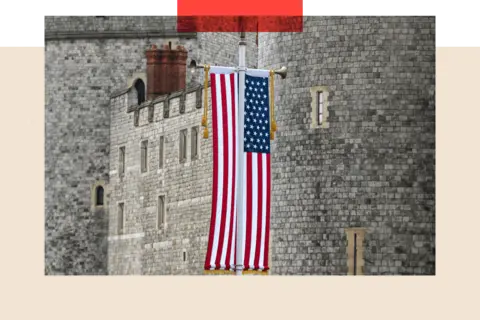 Mark Kerrison/In Pictures via Getty Images
Mark Kerrison/In Pictures via Getty ImagesFor Palace officials, attention to detail is all.
One of the biggest problems has been finding a place to muster the Household Cavalry.
It needs to be far enough from the helicopter landing zones to ensure the horses are not spooked by the noise, close enough to form the escort quickly that will accompany the Trumps’ carriage procession through the grounds of Windsor Castle.
There has also been much discussion between the Palace and Foreign Office over who sits where at the State Banquet in St George’s Hall.
“The value of these things are not just the photo opportunities but also all the off-grid conversations,” said one royal insider.
“A huge amount of attention goes into the seating plan for the banquet. So people with certain policy areas are sat next to one another.”
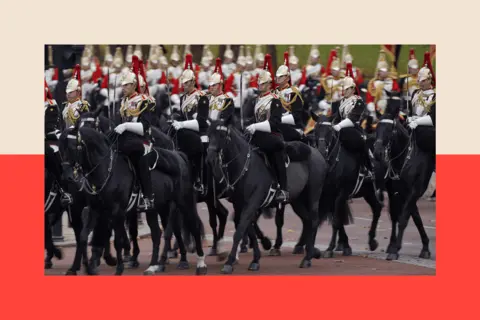 Jonathan Brady – WPA Pool/Getty Images
Jonathan Brady – WPA Pool/Getty ImagesMuch thought, too, is devoted to the menu and the music which will involve “lots of nods to his Scottish heritage”.
King Charles III’s seven-minute speech at the banquet has gone through many drafts, ensuring he pushes the right buttons without crossing political lines.
Officials say they have been given no indication by their US counterparts of what Trump may say in his speech.
‘Pressure to make this massive’
So far, so logistical – but the key challenge for royal organisers has been finding a way of ensuring Trump feels he has been given a full state visit with all the trimmings. That is no easy task.
The president is on the ground for less than 48 hours and will not visit Downing Street, address Parliament or even find time to play a round of golf.
“There has been a large amount of government pressure to make this massive and that’s been the challenge,” one courtier told me.
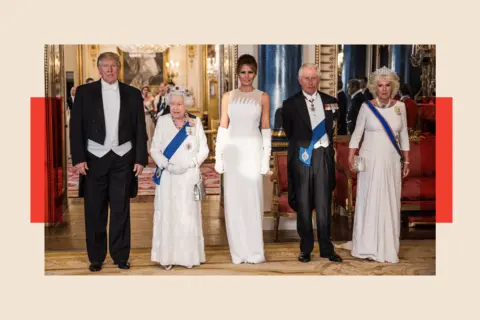 Jeff Gilbert – WPA Pool/Getty Images
Jeff Gilbert – WPA Pool/Getty ImagesThe scale of the ceremonial at Windsor has been stepped up, with 1,300 troops and 120 horses involved – far more than those used when President Macron of France visited earlier this year. (It’s a point that will no doubt be emphasised to the Americans in private.)
For the ceremonial hoopla is the overwhelming focus of the White House in this visit; a chance for the President to be photographed with the King and Queen and the Prince and Princess of Wales, along with military parades and bands and the Red Arrows.
One Whitehall source said: “The focus is very much on the optics, the historic moment, the pomp. For Trump it’s all about TV and this is great TV.”
Another said: “It’s theatre. It’s all show. It’s not like we are going to do deep substance. We are sucking up to the most powerful guy in the world for good reason.”
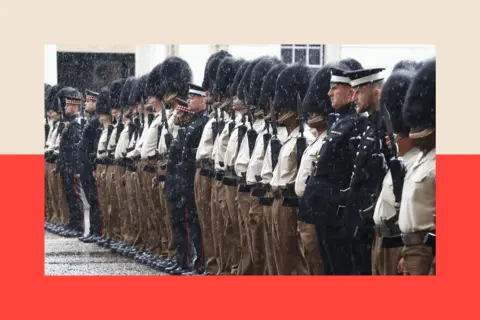 Peter Nicholls/Getty Images
Peter Nicholls/Getty ImagesThe Trumps: Warm and solicitous guests
Lord McDonald, a former top civil servant in the Foreign Office, said the UK’s strategic choice to afford the most powerful man in the world “the fullest honour British protocol allows” will be watched closely by the rest of the world.
“This state visit is not just a UK-US event,” he said. “It will be one of the biggest stories around the world.
“The rest of the world will be looking at London and Windsor, burnishing the UK’s wider international standing.”
Many officials are confident the visit will go smoothly, simply because all sides want it to succeed.
They emphasise that Palace staff thought the Trumps were warm and solicitous guests in 2019, both keen not to put a foot wrong.
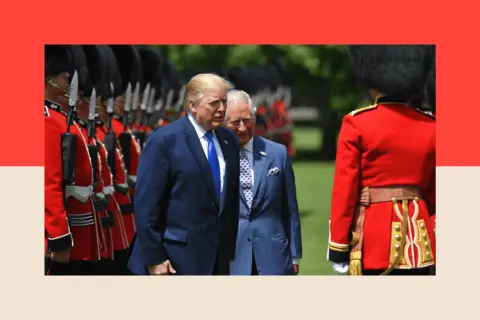 Mandel Ngan/AFP via Getty Images
Mandel Ngan/AFP via Getty Images“Trump can be quite funny in private,” said one diplomat. “He has got quite a neat turn of phrase that the King will appreciate.”
For the UK government, the overwhelming aim is for Air Force One to take off on Thursday evening with Trump warmly disposed to Britain.
Serious business behind the pageantry
Beyond providing a day of royal pageantry, the government has business to conduct on Thursday when proceedings move to the prime minister’s country residence at Chequers.
Ministers hope to complete a deal to exclude UK steel and aluminium from US tariffs. There will be some new civil nuclear cooperation.
The centrepiece is set to be the signing of a technology partnership, involving new investment in Britain and greater cooperation with Silicon Valley on artificial intelligence and quantum computing.
This was Lord Mandelson’s priority, something he described in his outgoing letter to embassy staff last week as “my personal pride and joy”, that he claimed would “help write the next chapter of the special relationship”.
All these issues will be portrayed as big domestic “wins” to help promote the government’s growth agenda.
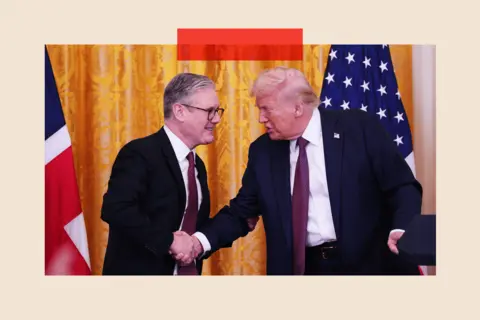 Carl Court – Pool/Getty Images
Carl Court – Pool/Getty ImagesThe visit will also provide Prime Minister Sir Keir Starmer with a significant opportunity to bend the ear of the president just a week before the United Nations general assembly in New York, especially on Ukraine.
Jeremy Hunt, who as Foreign Secretary was heavily involved in the last Trump state visit, said this was a key chance to shape the president’s thinking.
“Trump appears to be on a journey away from Putin, towards recognising that he needs a way of standing with his European allies a bit better,” Hunt said.
“What the government will really be wanting to do is continue that journey, looking for a deal to impose more sanctions on countries buying Russian oil.”
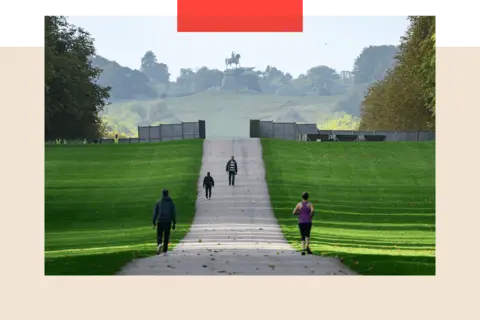 Leon Neal/Getty Images
Leon Neal/Getty ImagesSophia Gaston, senior research fellow at King’s College London, said the state visit was an important chance for the UK to influence US policy at a crucial stage of the Trump administration, a window of opportunity between its disruptive first six months and next year when its focus may shift to domestic elections and strategic competition with China.
“We are moving into a new phase,” she said. “This state visit really does matter. It is about us securing a foothold as the primary symbolic and strategic ally of the United States.”
The Mandelson question
For all these potential gains, the risks are huge and the most obvious involves, of course, Lord Mandelson.
The peer’s dismissal as ambassador, after revelations of the scale of his friendship with Jeffrey Epstein following Epstein’s conviction as a paedophile, means the press conference at Chequers on Thursday will not be dominated by questions about his future.
Instead, the prime minister will likely be asked why he appointed the peer in the first place and why he took so long to sack him; what did he know and when?
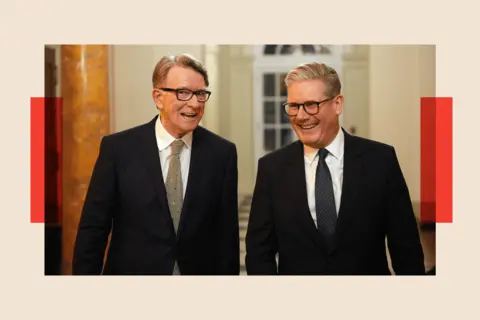 Carl Court/Getty Images
Carl Court/Getty ImagesSome diplomats wonder if Trump may voice an opinion about who should replace Lord Mandelson, potentially putting No 10 in an invidious position.
But perhaps the most dangerous question for the Prime Minister may be why he thinks Lord Mandelson should be punished for his links to Epstein, but not the US President standing next to him.
According to Whitehall sources, this was a point Lord Mandelson deployed as he fought to save his job.
It was not an argument that found favour in No 10 and officials note Trump, unlike Lord Mandelson, cut ties with Epstein well before his conviction – but it is a question that will float above this week’s royal and political ceremonial.
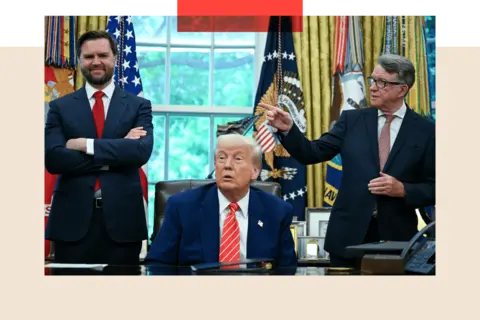 Jim Watson/AFP via Getty Images
Jim Watson/AFP via Getty ImagesDiplomats I have spoken to insist that so far the White House has been sanguine – if not a little bemused – at Lord Mandelson’s departure, saying it is the UK’s business, and the president remains excited about the state visit.
But there is a fear among some that if Trump were dragged into the controversy and embarrassed at the press conference, then that could sour his mood – and the visit.
Profound differences in the UK and US
The Mandelson affair is not the only potential challenge. As one distinguished former British ambassador told me: “On values and policies, we have fundamental differences with the Trump administration – on Nato, Ukraine, Middle East and China.
“The differences are more profound than at any time since World War Two.”
Perhaps the most acute difference that could overshadow the visit relates to the Middle East.
Next week the UK is expected to formally recognise Palestinian statehood in an attempt to keep alive the idea of a so-called “two state solution”.
But the Americans are strongly opposed, as the Secretary of State, Marco Rubio, made clear on Friday, emphasising his commitment “to fight anti-Israel actions including unilateral recognition of a Palestinian state that rewards Hamas terrorism”.
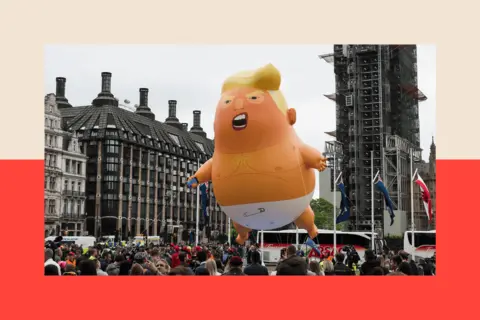 Getty Images
Getty ImagesThere are also political risks for the prime minister. Underlying this state visit is an unspoken transaction: that it is worth giving Trump all those trimmings in order to help British interests, namely to reduce tariffs and foster investment partnerships.
Yet Trump is unpopular in the UK. A YouGov poll in July found only 16% of Britons surveyed say they have a positive view of him.
The government will have to explain to voters why it believes this state visit is a price worth paying to try to grow the British economy.
The diplomatic game of cards
Amid these potential pitfalls lies a deeper, but less discussed risk from this state visit. That is: in its diplomatic game of cards, has the government played its King too explicitly for political purposes?
“The government have the convening power of the King and they have used it in a very transactional way, for example the brandishing of the King’s letter in the Oval Office,” said one royal source.
“They realise the Palace can draw people in, in a way that you can’t in Whitehall.
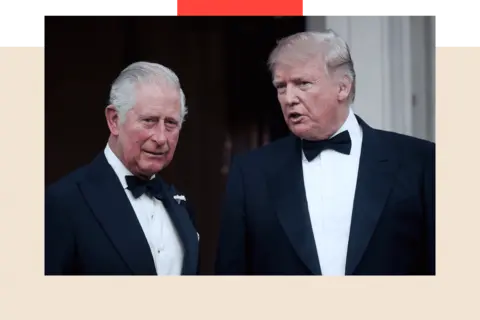 Peter Summers/Getty Images
Peter Summers/Getty Images“The problem in using the personality of the monarch and the institution of the monarchy is there is a risk that you cross a line and you ask someone who has to remain studiously non-political to transact a political act on behalf of the government.”
Official state visits by US presidents are rare. There have only ever been three: President Bush in 2003; President Obama in 2011 and Trump in 2019. All other visits were official or informal. So this week’s does matter.
But even if it passes off smoothly and gaffe-free questions may remain about its efficacy. “This is very early in Trump’s presidency,” one diplomat said.
“Have we played this card too soon? What do we do for an encore?”
Top picture credits: Win McNamee/Getty Images, Neil Hall /EPA/Shutterstock and Hollie Adams, WPA Pool/Getty Images, Yuri Gripas/Abaca/Bloomberg via Getty Images
BBC InDepth is the home on the website and app for the best analysis, with fresh perspectives that challenge assumptions and deep reporting on the biggest issues of the day. And we showcase thought-provoking content from across BBC Sounds and iPlayer too. You can send us your feedback on the InDepth section by clicking on the button below.
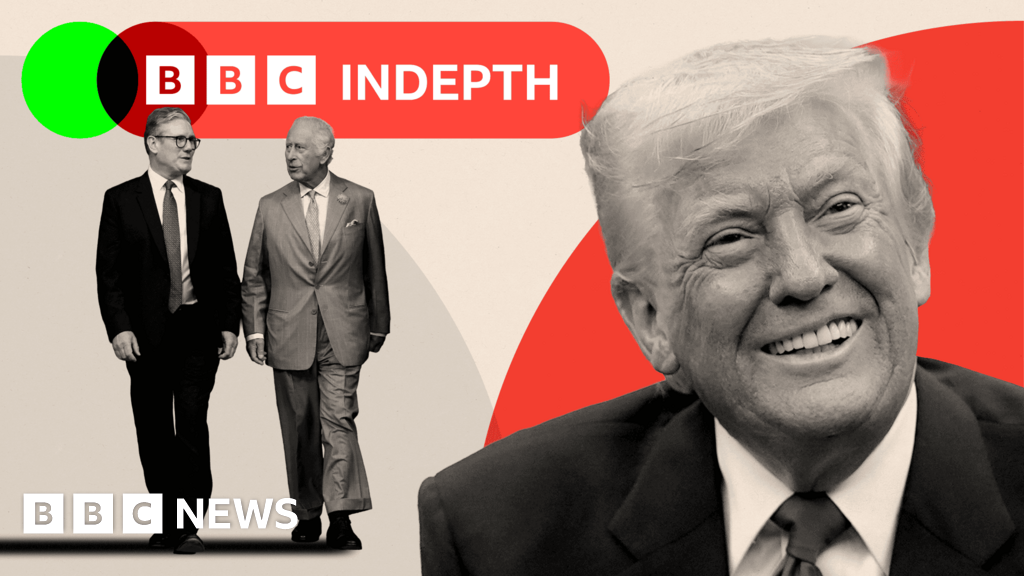

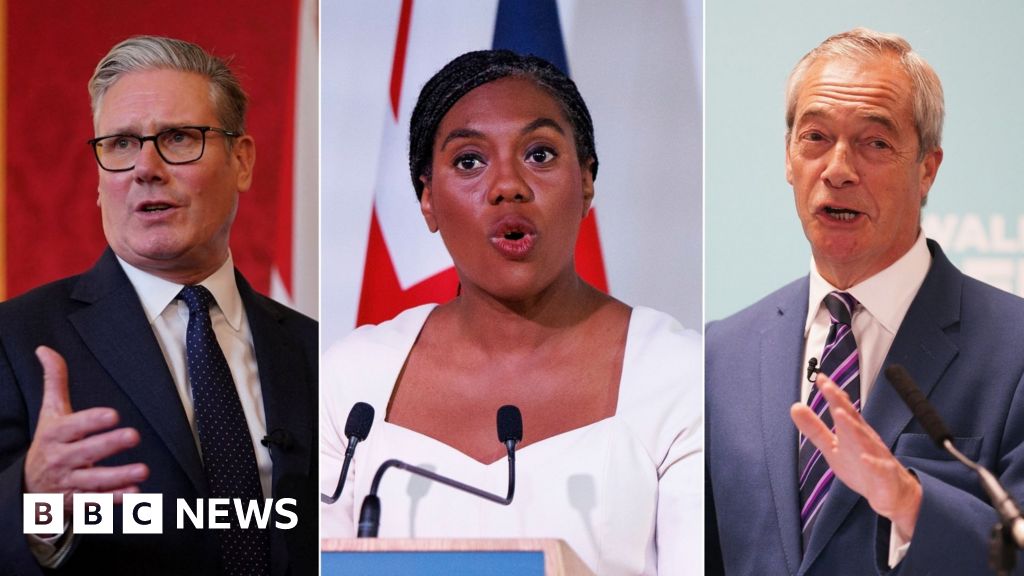

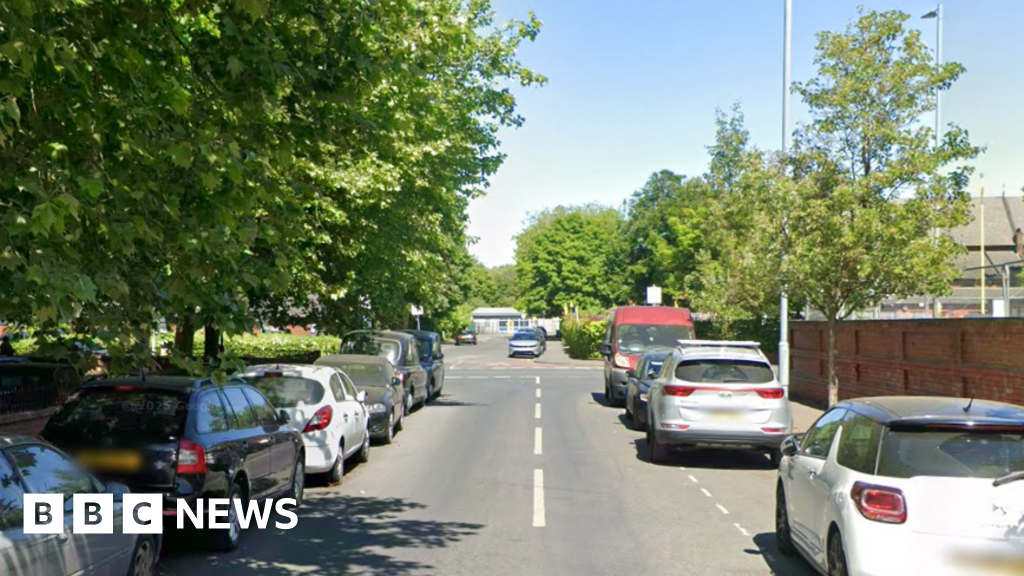
إرسال التعليق